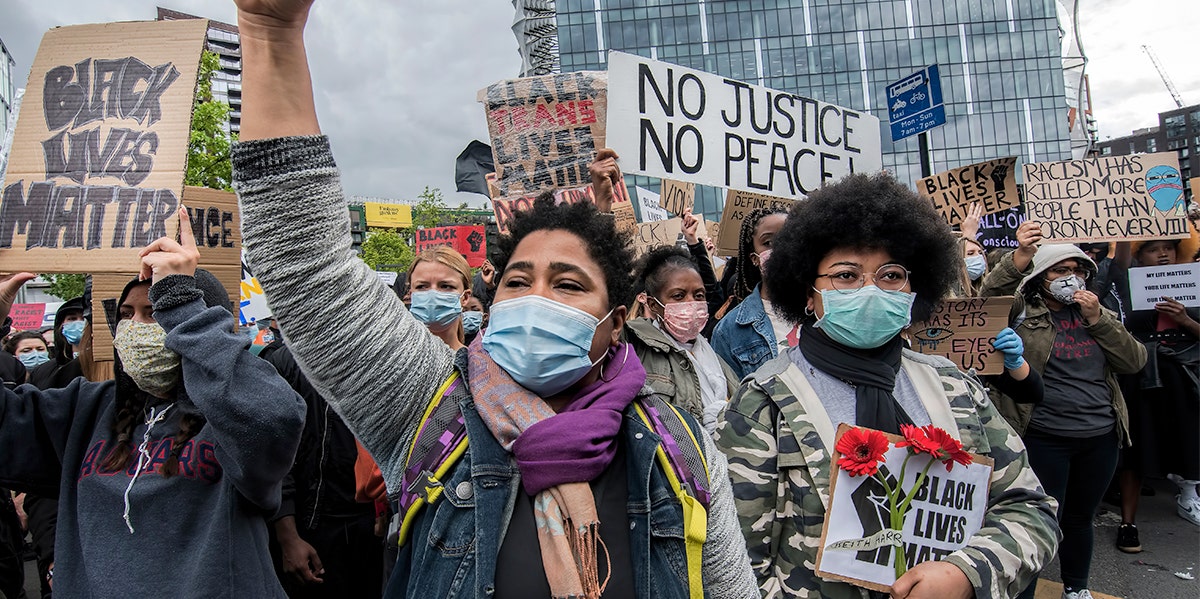White People: Being A Good Ally To The Black Community Doesn't Mean Always Trying To Relate To Us
Allyship should be about listening, not inserting yourself.
 Koca Vehbi / Shutterstock
Koca Vehbi / Shutterstock Since the civil unrest that happened during the summer of 2020, conversations surrounding race have become more prominent. That's a good thing.
Non-Black people are starting to educate themselves on issues that have been plaguing the Black community for too many years.
There have also been conversations involving what it actually means to be a good ally to the Black community.
Of course, being a good ally starts with watching educational movies, reading books by renowned activists, listening to educational podcasts. Understanding the power dynamics in America and realizing the closer an individual is to whiteness the more privilege someone will have is the first step.
More critically, though, good allyship is about making sure that as a white person, you don't unintentionally divert the conversations away from Black people when they tell you about their lived experiences.
Allyship is about actively and critically listening to Black people when they talk about their experiences with racism and the heavy impact it has had on us throughout our lives and the lives of our ancestors.
When Black people talk about our experiences, we are not looking for white people and non-Black people to interject with their own thoughts, or somehow try to relate to our experiences.
Sameness isn’t the goal.
The goal is feeling that white people and non-Black people hear us — and understand what their part is in the social justice narrative.
Allyship starts with knowing your place in the conversation about race.
Too often than not, white people think it’s their jobs to become some sort of savior when it comes to hearing the struggle about Black people. They want to take the metaphorical baton and lead us into a post-racial society.
While that eagerness is appreciated, it is not needed.
Black people don’t need anyone to “save us.”
What we need is for white and non-Black allies to confront their own biases and show up when they witness something racist, whether it's a micro- or major-aggression.
Social justice activist and anti-racism educator Marie Beecham posted a helpful guide to how white people can respond in conversations when Black people are talking about their experience with racism.
In her Instagram post, she states “We don’t need to manipulate our stories until they’re as identical as possible in order to form a deep and meaningful relationship.” And I agree.
Being an ally means not diverting the conversation away from Black people. It means not trying to interject and racially gaslight your Black friends and/or colleagues.
The Black Lives Matter movement works best when white and non-Black allies use their privilege for the benefit of making sure the movement is heard all around the world.
That means showing up to protests, but not letting your voice be the loudest one. That means speaking up when you witness racially-charged comments or actions done that are hurting the Black community.
In the age of social media activism, it’s extremely easy now to repost things on your Instagram stories — remember the black square backlash? — or retweet an infographic. Those are helpful, but a bit empty.
True allyship is about checking in and making sure your Black friends are doing okay, physically and mentally.
It’s about ensuring they know that you are here, that you care, and that you’re willing to listen and fight for a better society.
The endless suffering of Black people affects our entire country.
Because if one group in America is suffering, then we all suffer.
Nia Tipton is a writer living in Chicago. She covers pop culture, social justice issues, and trending topics. Follow her on Instagram.

